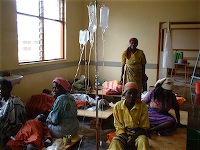Cholera Crisis Claims 39 Lives
Outbreaks are seldom seen in the U. S. or Europe, but an outbreak of cholera is far too common in African, and other third world nations. The very word is often synonymous with "death", and it can spread at a pace that health officials find it impossible to contain.
In 2002 Suzi Stephens R.N., the Medical Director for the Malawi Project was serving in Malawi when a serious outbreak of cholera occurred in a hospital and secondary school in Madisi. Stephens reports the critical situation as it deepened into a very serious state, "Madisi is about 45 miles north of the hospital in which we were working near Lilongwe. When we received word of the critical situation we stopped everything and started packing supplies in order to rush aid to the tiny trading center. Cholera is extremely contagious and can wipe out entire communities in a matter of hours if help does not arrive quickly," Stephens notes.
Worst Thing I Had Seen in 35 Years
"Arriving on the scene we found the hospital already full of patients," Stephens continues. "In fact we later learned the hospital and nearby school were at the epicenter of the problem. It was the worst thing I have seen in 35 years of nursing. After stepping in a container of bleach to contain the epidemic we rushed into a nearby ward where 50 patients
were all without beds. The beds had actually been moved out and the patients were lying on plywood sheets elevated off the floor on bricks. There was a rough cut round hole in the middle of each platform for the uncontrollable excretion to be released into a pan placed below the platform. The flow was nearly continuous and the stench in the hospital was indescribable. It was beyond.jpg)
"In this case," Stephens reports with a sigh, "the needed medical supplies, including intravenous fluids, oral rehydration solutions, IV sets, catheters, alcohol, basins, rubber gloves, towels, and blankets reached the site in time to help stem the crisis. It was controlled and the crisis contained with only one death."
News Today Is Not So Good
The news in other parts of the country then and the reports today do not have the same happy ending as the report by this American nurse in a location where the right supplies reached the right people at the right time to stem the crisis. Although Madisi only counted one life lost, the rest of the nation was not so lucky, and outbreaks claimed over 1,000 lives in a short period of time.
Already today’s crisis has claimed 39 lives and over 1,142 cases have been reported. Poor sanitation and heavy, seasonal rains ushered in the outbreak in mid-November in the capital city of Lilongwe. It then spread to outlying areas where there is no running water. Currently the disease is reported in at least 30% of the districts in the county. The highest is in the area in and around the capital city.
A shipment of medical supplies, including large amounts of rehydration solutions, is in route to the country from Germany, Italy and Spain. This shipment is in cooperation with World Emergency Relief based in Carlsbad, California and the Malawi Project.
Pictures were taken during the cholera epedimic in 2002 in Madisi, Malawi
.jpg)


.jpg)
.jpg)